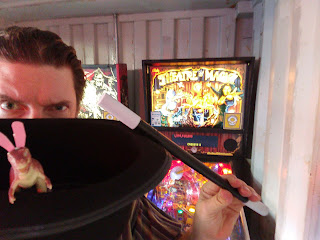A lot of students experience math as something teachers say is process-oriented, but the students' actual experience is that it is product oriented. The concerns are, in order of importance: Am I done? Am I right? And often "am I right?" is a distant 2nd in importance. For the adults, the primary concern is "have I learned the skill?" Until the students and adults have found common ground by explicitly discussing these different lenses, everyone tends to be a little frustrated and feel like the other's behavior is inexplicable/unreasonable. The adults have to realize that the students' assumptions are reasonable, as is their approach, and, especially in middle school, students will need to feel some agency in the process of changing their approach to work. "Show your work" feels like "clean your room," unless the student feels like they are in a collaborative learning relationship with their teacher, and can understand that showing the teacher their thinking is their part of that collaboration. We adults also have to realize that the assertion that we are collaborating for the student's good is highly dubious, on the surface: we offer them more choice or less choice in any given situation, but the very fact that it is ours to offer is entirely worthy of resentment and suspicion from anyone trying to assert autonomy: they have to go to this school; they have to work with this teacher; they have to do this work... but I, this willing participant in this oppressive institutional setting, swear I'm here to help! I worry more about the students who don't push back.
A guiding principle of my work is that I cannot build motivation in an area where students feel more unsuccessful than successful. They simply have to feel successful much more than 50 percent of the time, or any normal person will prefer other activities. Teaching students to notice and celebrate micro-successes is a key life skill.
In math, specifically, the primary foe, or at least, the starting place, is differentiating between challenges with conceptual understanding vs challenges with accuracy. Many students experience math as a "right or wrong" zone (setting aside the above insight that "done or not-done" may be far more important to the student who sees schoolwork in general as a barrier to freedom/autonomy), and whether they make a "careless error" (accuracy) or a conceptual/procedural error that reflects a developing understanding or skill, they simply feel wrong, which is demotivating (and also MOTIVATES rushing, because it feels bad and so we want to be out of it sooner). Kids need to know that conceptual errors are a part of learning (blah blah blah...but, no, really! (ok prove it)), and
if their calculations were accurate, then a "wrong" answer is actually right in two ways: their calculation skills are strong, and they are closing in on the correct procedure/understanding by filtering out what doesn't work, and (hopefully) why. For those of us who have carried the right/wrong framework into adulthood ourselves, asserting this for a student can come off as disingenuous (a deeply middle-schooler-repellent thing, and also super common and obvious to students), but we need to do the (emotional?) work to truly see that it isn't! We are not pretending a wrong answer is right! We are parsing the genuine rightness, and thereby modeling the process-oriented mode of math-learning in a genuine way.
If their calculations were inaccurate, but their conceptual understanding is strong, they are right in the most important way: they have met the primary learning goal of the lesson! Plus, congratulations: you have entered the realm of the adults! You ask what does this learning have to do with real life aka when will I ever use this? Well, accuracy is the most straight-forward and disappointingly simple problem to solve, and millions of adults' jobs depend upon their ability to be accurate in areas where they 100% understand the conceptual framework and the stakes, but a mispunched key on a calculator, typo on a spreadsheet, or ambitious use of mental-math can make them wrong in a truly consequential way. So what do we do? We use inverse operations, we re-enter the data in the opposite order, we get another set of eye-balls onto the work... And most importantly, getting back to math class, I believe, in the context of right/wrong, done/not-done, this kind of "checking your work" sounds just like "showing your work" (aka clean your room, check your email, eat your vegetables....), but in the context of "wow, you have such a great conceptual understanding on every single one of these problems, so you can tear through them at light-speed! So cool. Let's figure out how to boost the accuracy piece so you don't get fired :P" or "Man, your calculations are PERFECT! I'm so jealous! It looks like you don't know that you have to multiply by the reciprocal yet, though. But with calculation skills like that, you'll be rockin' these next time around...!" it becomes a conversation about making a good thing better.
BTW I dropped that "careless error" thing in without addressing it. I think that term is SUPER judgy. Careless errors don't feel careless; kids are putting in the effort they know how to put in. Well, at least, ADHD kids like me are. And the voices that tell us our best efforts are insufficient become the internalized voices that lead us to blame ourselves and even hate ourselves for not doing things we know we should, don't know why we don't, but in fact can't, at least until we learn or are taught how. For some of us, avoiding the careless errors takes MUCH more "care" than conceptual errors ever will. I guess I think that when we say "careless errors" we are erroneously (carelessly?!) projecting the ease we would have avoiding such errors onto a kid, and I just don't think we actually know how easy or hard that is for that kid, and asserting that it is a lack of care is just mean, because it shows them we assume they made the choice not to take care. It's disrespectful. And this builds distance between us and our students, which is the opposite of what we need, if the work of teaching and learning is ever going to feel collaborative to the students.









